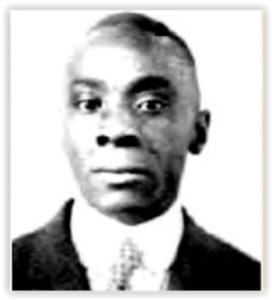
Willis N. Huggins
*Willis Huggins was born on this date in 1886. He was a Black historian, teacher, and social activist. He was among the earliest proponents of teaching African and African American history in American schools.
Willis Nathaniel Huggins was born in Selma, Alabama; his father, Reverend A. Z. Huggins, was a Baptist minister. Huggins received his first education at the Selma Training School as a youth. The Huggins family then joined the wave of Black migrants to the North and moved to Washington, D.C. Huggins, an excellent student, attended Armstrong High School for colored youth. During his senior year, he won a scholarship to Columbia University.
After graduation, he moved to Chicago, Illinois, where he worked as a high school teacher. During the Chicago Race Riot of 1919, Huggins became involved in the New Negro Movement, writing for several pro-African American journals. He also became involved in the "Garvey movement" to popularize black history, along with Arthur Schomburg and John Edward Bruce.
In 1924, he moved to New York City to continue teaching. Black teachers were still unusual in the New York public school system, and Huggins' attempts to include African and African American history within the curriculum were strongly opposed. Instead, Huggins and other black teachers taught students out-of-school African American history classes. In 1932, he became the first Black student to receive a Ph.D. from Fordham University.
He promoted the serious study of African and African American history as associate director of the Blyden Society. In 1934, he co-wrote A Guide to the Study of African History with John G. Jackson as a prospective guide to teaching African history in schools. The two later wrote An Introduction to African Civilizations with Main Currents in Ethiopian History in 1937. Huggins was also a passionate campaigner for Ethiopia during the Italo-Ethiopian War and its occupation by Italy. He became executive director of the International Council of the Friends of Ethiopia. The American League sent him Against War and Fascism as a special envoy to the League of Nations in Geneva on behalf of Ethiopia. He argued against Italian fascism and criticized American neutrality.
Huggins went missing on December 23, 1940. The only clues to his whereabouts were an overcoat found on the George Washington Bridge and a letter Huggins sent to his wife stating that "Something is going to happen." At the time of his disappearance, Huggins taught history and economics at Bushwick High School in Brooklyn and served as Assistant Principal at Harlem's Union High School in the evening. Seven months later, on July 15, 1941, his body was recovered from the Hudson River by police. His death was ruled a suicide by the police, his family, and his lawyer. Despite this, some of his students at the Blyden Society and Harlem Community Center voiced concerns that gangsters may have murdered him over unpaid business loans.